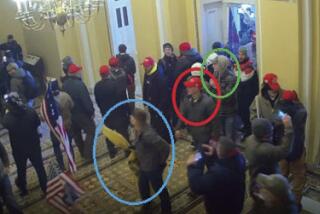Marine Hero to Be Decorated for His Bravery
- Share via
CAMP PENDLETON — It has become one of the iconic pictures of the war in Iraq: blood-soaked Marine 1st Sgt. Brad Kasal, grim-faced and still clutching his service pistol, being helped from a firefight by two younger Marines.
Although wounded by seven AK-47 rounds and hit by more than 40 pieces of hot shrapnel from a grenade, Kasal refused to quit fighting and is credited with saving the lives of several Marines during the U.S. assault on insurgent strongholds in Fallouja in November 2004.
“He was hurt bad, but for the most part, he was more worried about his Marines than himself,” said then-Cpl. R.J. Mitchell, one of the Marines involved in the firefight in a two-story stucco house.
Kasal has undergone 21 surgeries and months of painful rehabilitation to repair his injuries and attempt to save his right leg.
Today, the 39-year-old Iowa native will be promoted to sergeant major, the highest enlisted rank in the Marine Corps, and receive the Navy Cross for combat bravery, second only to the Medal of Honor. Only nine others have received the Navy Cross for service in Iraq or Afghanistan.
Maj. Gen. Richard Natonski, commanding general of the 1st Marine Division, said Kasal “set an example for future generations of combat leaders to emulate.”
The picture, taken by Lucian Read, a photographer for World Picture News who was embedded with the Marines, has been widely reprinted. It was used on the back cover of “No True Glory,” an account of the fight for Fallouja by Bing West, the premier historian of Marines in combat in Iraq.
Kasal, in his second tour in Iraq, was with the Weapons Company, 3rd Battalion, 1st Marine Regiment, 1st Marine Division, during the assault. At the height of the fighting Nov. 13, Marines were going door to door. Insurgents were often waiting upstairs to rain down AK-47 fire and grenades.
When Kasal learned that three Marines were pinned down in one house, he and other Marines went to their aid.
Once inside the house, Kasal barked orders to younger Marines to cover vantage spots where insurgents might be hiding. He turned into one room and immediately ran into an insurgent who cried out in Arabic. The two exchanged gunfire; the insurgent missed and Kasal killed him.
Other insurgents fired at the Marines from upstairs, hitting Kasal and others. Kasal fought his way to a wounded Marine and used a tourniquet on his leg to keep him from bleeding to death. When he spotted an insurgent’s grenade, he sheltered the wounded Marine with his body to protect him from the blast.
Kasal refused medical attention until other Marines were helped and made sure Marines in the street knew there were Marines inside so none would be hit by so-called friendly fire.
“Although severely wounded himself, he shouted encouragement to his fellow Marines,” the Navy Cross citation states. By the time he was evacuated, Kasal had lost about 60% of his blood and was barely conscious.
Marines who knew Kasal before the fight were not surprised at his actions. “He led by example -- always,” said Mitchell, 26, who was wounded for the fourth time during the fight and is now medically retired from the Marine Corps and studying to be a motorcycle mechanic in Phoenix.
Kasal said the picture and the acclaim it has brought him should not overshadow the actions of other Marines in the same fight. “That house was full of heroes,” he said.
Doctors initially told Kasal that his right leg below the knee was so badly mangled it might not be saved, and that subjecting himself to surgeries and rehabilitation could prove futile. Four inches of bone had been shot away.
Kasal opted against amputation, knowing that it would mean the end of his career in the Marines. “I decided to gut it out and work through the pain,” he said. “I wanted to do whatever was needed to keep it going.”
Six days a week, he does two to four hours of rehabilitation. Recently, the onetime high school wrestler and football player was able to run for the first time since Fallouja. “It wasn’t pretty, but I was able to do it,” he said.
Kasal, who is single, has been assigned to a recruiting station in Des Moines. He did three years as a recruiter in the 1990s in Minnesota, the only stretch in his 21 years in the Marine Corps in which he has not been assigned to an infantry company.
His goal is to get strong enough to return to the infantry and go back to Iraq. “We started it; we need to finish it,” he said. “I believe in what we’re doing. I’d go back in a heartbeat.”
More to Read
Sign up for Essential California
The most important California stories and recommendations in your inbox every morning.
You may occasionally receive promotional content from the Los Angeles Times.










